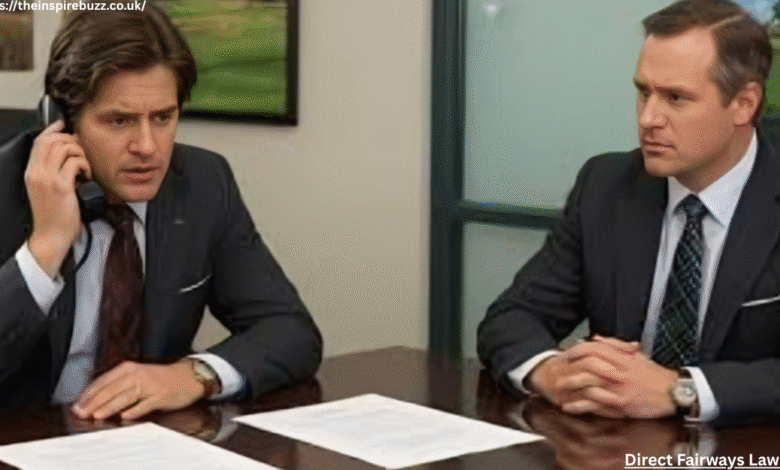Uncovering the Truth Inside the Direct Fairways Lawsuit

Direct Fairways, a name that once echoed through the golf marketing world, has recently found itself under scrutiny due to a series of legal challenges. Known for offering marketing and advertising services to golf courses and local businesses, the company’s model was built on promises of increasing visibility and driving engagement for its clients. However, recent developments surrounding the Direct Fairways lawsuit have cast a shadow over its operations, prompting questions about its business practices and ethical standards.
The legal proceedings have garnered significant media attention, not just because of the parties involved, but also due to the broader implications for small businesses and marketing firms nationwide. This article delves deep into the background of the company, the genesis of the lawsuit, and the ongoing consequences of the legal battle. Through a comprehensive overview of the case, readers will gain insight into how such disputes unfold and what lessons can be learned by both service providers and clients alike.
Whether you’re a business owner considering outsourced marketing, an employee within the advertising industry, or a concerned customer following the headlines, this exploration of the Direct Fairways lawsuit offers essential information and analysis. With so much at stake—reputation, finances, and trust—it’s crucial to understand how one company’s legal battle became a cautionary tale for an entire sector.
Background on Direct Fairways
Direct Fairways began as a specialized marketing firm targeting golf courses across the United States. Their core offerings included customized scorecards, digital advertising campaigns, and promotional materials designed to attract sponsors and local advertisers. By positioning themselves as a niche solution for golf course marketing, the company quickly carved out a presence in this tight-knit industry.
Their business model relied on partnering with golf clubs and local businesses, offering to create professional-grade materials that advertised sponsors while enhancing the course’s appeal to players. The model seemed mutually beneficial: golf courses received complimentary marketing collateral, while Direct Fairways profited from the businesses advertising on these materials. In theory, it was a win-win—at least on the surface.
However, over time, cracks began to appear. While many clients praised the company’s fast onboarding and low upfront costs, others reported issues with delivery, billing, and unmet expectations. Some businesses claimed they paid for ad placements that never materialized, while others reported high-pressure sales tactics and vague contract terms. These growing complaints began to tarnish the brand’s reputation, laying the groundwork for what would eventually evolve into legal action.
Despite these challenges, Direct Fairways maintained operations and even expanded in some regions, doubling down on their services and defending their practices. Yet behind the scenes, dissatisfaction was quietly building, with customers and former employees voicing concerns that would soon become central to a significant lawsuit.
The Origins of the Lawsuit
The Direct Fairways lawsuit officially began after a series of formal complaints were filed by disgruntled clients and former partners. These legal challenges primarily centered around accusations of deceptive business practices and breach of contract. Multiple plaintiffs alleged that the company had failed to deliver on its promises, leaving businesses without the advertising exposure they were promised and sometimes even incurring unexpected charges.
According to public records and legal filings, the case gained momentum when several businesses banded together to take collective action. These clients claimed they had been misled during the sales process, coerced into signing ambiguous agreements, and later ignored when they requested refunds or clarification. Some also pointed to the use of aggressive telemarketing tactics, stating that Direct Fairways representatives made unrealistic guarantees about ROI (Return on Investment).
In many of these cases, the fine print of the contracts was either not disclosed or was difficult to interpret, leading to disputes over billing, duration of services, and fulfillment of advertising placements. As more voices joined the chorus of discontent, the company’s practices became the subject of formal legal scrutiny.
The lawsuit quickly escalated beyond a minor dispute, involving legal counsel, media coverage, and state authorities. Though Direct Fairways initially dismissed the allegations as isolated incidents, the volume of complaints and legal interest told a different story—one of systemic issues rather than one-off errors.
Key Legal Allegations and Proceedings
At the heart of the Direct Fairways lawsuit were several serious legal allegations. Chief among them was the accusation that the company engaged in misleading and deceptive marketing practices. Plaintiffs argued that sales representatives overpromised results and misrepresented the nature of the services being offered, leading to financial losses and damaged reputations.
Another major component of the lawsuit involved breach of contract. Clients alleged that despite paying for advertising services—such as scorecard placements, online listings, and promotional campaigns—these services were never fulfilled or were executed far below expected standards. In some instances, businesses reported waiting months for delivery of materials, only to receive products that were riddled with errors or never distributed.
Court documents revealed a growing list of testimonies from affected clients, each adding weight to the claim that the company’s operations were not as transparent or reliable as advertised. In response, Direct Fairways maintained their innocence, insisting that they operated within legal and ethical boundaries and that any lapses were rare and unintentional.
Legal proceedings continued with court hearings, motions to dismiss, and counterclaims. The defense argued that many clients misunderstood the nature of the agreements and that the company made good-faith efforts to resolve disputes. However, as evidence mounted, it became clear that the case would not be resolved quickly or quietly.
Impacts on Stakeholders
The lawsuit’s ripple effects were felt far and wide. For many clients, the financial losses were significant—some had spent thousands of dollars expecting regional exposure or customer traffic that never came. Small businesses, especially, found themselves squeezed by the broken promises and the need to seek alternative marketing solutions mid-campaign.
Employees and former staff of Direct Fairways also reported being caught in the crossfire. Internal conflicts arose, and some employees left the company citing concerns over sales tactics and management decisions. Whistleblower reports began to surface, offering a glimpse into internal practices that may have contributed to the legal issues at hand.
Perhaps most damaging was the blow to the company’s public reputation. Online reviews turned overwhelmingly negative, with former clients posting detailed accounts of their dissatisfaction. Social media channels and local business forums buzzed with cautionary tales, making it increasingly difficult for Direct Fairways to attract new business or repair its image.
Competitors in the marketing space seized the opportunity to attract disillusioned clients, often highlighting transparency and accountability as differentiators. The incident sparked broader conversations in the golf and marketing industries about the need for clearer contracts, client education, and ethical business practices.
Resolution Status and Ongoing Developments
As of the latest public records, portions of the Direct Fairways lawsuit have been settled, while others remain in negotiation or litigation. Some clients have received refunds or reached confidential agreements, but not all cases have been closed. Legal experts suggest that additional lawsuits could emerge if more clients come forward.
Direct Fairways, for its part, has pledged to review its internal procedures and improve customer communication. In some instances, they have revised contract language and offered apologies or restitution to affected parties. However, critics argue that such actions are too little, too late.
Industry watchdogs and business transparency groups have also taken notice, urging companies to enforce stricter standards for outsourced marketing services. The case has even prompted state-level consumer protection agencies to open their own investigations, indicating that the story is far from over.
Moving forward, the outcome of the Direct Fairways lawsuit may set an important precedent for how similar disputes are handled—and what expectations should exist between marketing firms and their clients.
Conclusion
The Direct Fairways lawsuit stands as a powerful reminder of the importance of transparency, accountability, and ethical practices in the business world. What began as a promising marketing service tailored to the golf industry unraveled into a cautionary tale that affected clients, employees, and the company’s own legacy.
While some damages have been addressed through legal settlements, the reputational impact may linger for years. For clients, it underscores the need to scrutinize contracts and demand clear communication. For companies, it highlights the risks of overpromising and underdelivering.
Ultimately, this case teaches us that no amount of clever marketing can cover up systemic problems. Only a commitment to honesty, quality, and customer service can build a brand that lasts.
FAQs
1. What is Direct Fairways and what do they do?
Direct Fairways is a marketing company that offers advertising services to golf courses and local businesses, including scorecards, signage, and online promotions.
2. Why was Direct Fairways sued?
They were sued for allegedly engaging in deceptive business practices, including unfulfilled services, misleading advertising claims, and unclear contractual obligations.
3. What were the main allegations in the lawsuit?
Key allegations include breach of contract, false advertising, aggressive sales tactics, and failure to deliver on promised marketing services.
4. Has the Direct Fairways lawsuit been resolved?
Some cases have been settled, while others remain active or are pending further legal action. The situation is ongoing.
5. How can businesses protect themselves from similar marketing issues?
Always read contracts thoroughly, verify the credibility of service providers, seek references, and insist on transparency before signing agreements.


